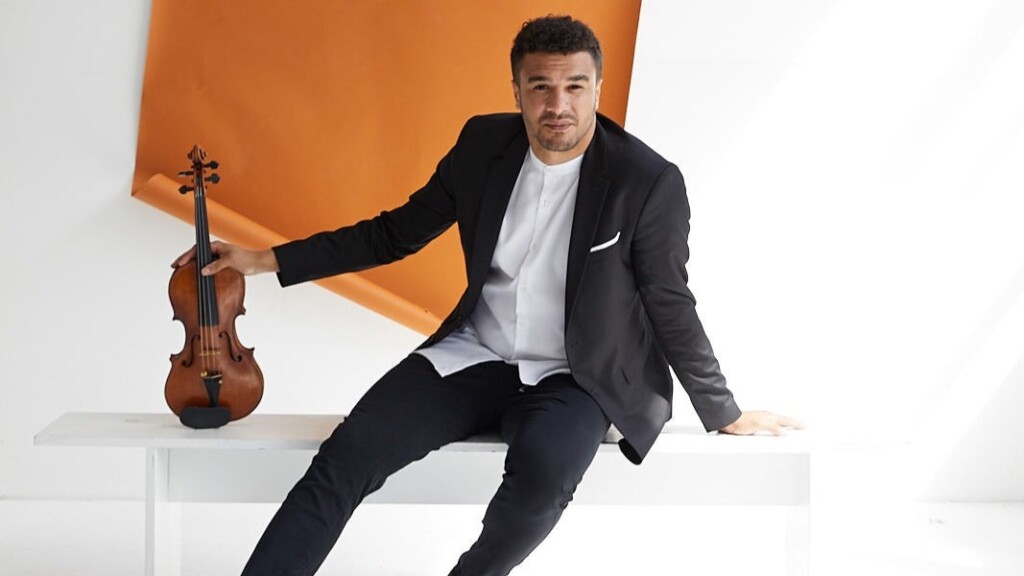
For the culture. For the change. For the music. Violinist Curtis J. Stewart is a musician that aims to create power and change in every string that he plays. With his latest project Of Power currently released, he chose to make this project a body of work that is relatable to the pandemic, the movement and the power of his voice. We got a chance to talk about why he did this project, his aspirations, and his style, which makes him unique. Curtis continues to bring a voice of color into the world of instruments, and he shows no signs of slowing down his pace at all.
As a violinist, we more so feel your music versus reading or hearing lyrics. How do you feel your craft comes alive with simply just playing with little to no lyrics attached?
I emulate all kinds of singers as a violinist and we always try to emulate the voice in some way. The violin has kind of made itself known in many different cultures around the world. It has its European heritage, but it also extends into the Gypsy heritage of all in Europe, as well as Asia. There are versions of the violin and the PIPA that go into Africa. It’s in all kinds of West African music. So, the violin is everywhere. It has this cross between the guitar and the voice that has moments where it can be energetic and fiery. This is where a lot of my classical training comes in. Playing is like shifting all around the instrument, trying to do as many different things in as many colors as possible and be as imaginative as possible. Sometimes I like to think that what I’m playing doesn’t even sound like a violin. It’s like, what is this instrument (laughs)? I ask myself how I get these sounds and how can I really try to capture them on the violin. It’s interesting because when I do play like that, and when I try to articulate the way that people sing, it comes out amazing.
Besides the ongoing brutality of Black people happening across the country, what inspired you to create this deeply rooted body of work Of Power?
I’ve been working on it for a while, and I have a million projects in the pot that I’m constantly adding to my concept boards. Of Power was going to be something that was going to be the third project. My first project was called Colors. It has to do with the psychology of color. Whether it’s socially or just abstractly, once a color hits someone’s skin it means something very different than if it’s on just a piece of paper. Suddenly, I was by myself during the pandemic, so it was important for me to figure out what it means to be by myself and to feel powerful, even if I’m in a vulnerable and painful position. That was in addition to all the horrible things that have been happening to people of color.
There’s this one song called Magic, which is me grappling with my mom getting sick. The main lyric is “I didn’t know you were my magic.” She was such a powerful force in my life, and when she had gotten sick, I didn’t realize what I was missing. There’s also one song that is almost like a lament for the murder of Breonna Taylor. As that was happening, I couldn’t stop thinking about it, and I didn’t know how to be authentic. One thing that struck me was imagining what it would have been like to be Vaughn Walker in his house trying to protect this person that he cared about, and then get thrown into jail. It’s just like imagining that scenario and what you’re feeling.

The QG Magazine is a publication that resonates with black men and men of color profoundly. How do you feel your brand contributes to the empowerment of the everyday man of color?
As a person of color, being half Greek and half Black, there aren’t many of us. Also, my dad is a jazz musician, and I hung out with him and his crew a lot. We would go on tours and travel around the world. I’d be around them, and to be able to see and feel that energy was an experience.
We create beautiful, complicated, intricate things, and we can look many ways, and sound many ways. We’re not a monolith, and we have many, many different colors and sizes too. There are many colors and sizes of being black and being a genius.

What more can we expect from you this year?
An album’s coming out called What is American? I’m also continuing to record some music. I have a project where I’m trying to get composers and electronic producers to collaborate and write pieces for violin and electronics. I love the idea of bringing people together who have communities that are not connected into the same space. So, when we play a concert like this, the composer brings five people, that producer brings five people, and I bring my squad, and suddenly we have a very diverse room. And who knows what other arts and what other conversations will spring just from them being in the same room and feeling this thing together. I’m trying to create projects where hip-hop does have a place on the concert stage as well. It’s such a huge influence on me. I’ve been listening to it for years since middle and high school, and I can remember hearing Busta Rhymes, dangerous blasting out of a car (laughs). It’s part of my world.
For more information on Curtis, you guys can follow him on Instagram.




